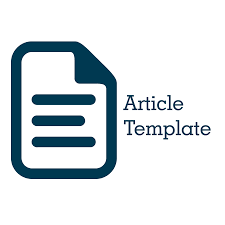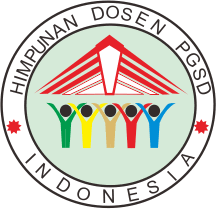Analisis keterampilan literasi digital peserta didik melalui penggunaan e-learning sekolahku di sekolah dasar
Abstract
Keywords
Full Text:
PDFReferences
[1] A. I. Vodă, C. Cautisanu, C. Grădinaru, C. Tănăsescu, and G. H. S. M. de Moraes 2022 Exploring Digital Literacy Skills in Economics and Social Sciences and Humanities Students Sustainability (Switzerland) (14)5 pp 1–31
[2] S. N. Afifah 2020 Perbandingan Tingkat Literasi Digital Guru SD Negeri dan SD Swasta di Kecamatan Laweyan pp 1–23
[3] A. A. Syahid, I. Isrokatun, and D. Nugraha 2019 Development of a Training Curriculum Structure to Improve ICT Competencies of Teachers in Primary Schools Mimbar Sekolah Dasar (6)1 p 21
[4] D. R. Wulandari and M. Sholeh 2021 Efektivitas Layanan Literasi Digital Untuk Meningkatkan Minat Baca Siswa Di Masa Pandemi Covid-19 Jurnal Inspirasi Manajemen Pendidikan (9)2 pp 327–335
[5] H. Rahmadani 2020 Profil Keterampilan Literasi Digital: Penelitian Survey di SMA IT Al Bayyinah Pekanbaru Instructional Development Journal (3)2 p 96
[6] A. Ramdani, A. W. Jufri, and J. Jamaluddin 2020 Pengembangan Media Pembelajaran Berbasis Android pada Masa Pandemi Covid-19 untuk Meningkatkan Literasi Sains Peserta Didik Jurnal Kependidikan: Jurnal Hasil Penelitian dan Kajian Kepustakaan di Bidang Pendidikan Pengajaran dan Pembelajaran (6)3 p 433
[7] E. Eryansyah, E. Erlina, Fiftinova, and A. Nurweni 2019 EFL Students’ Needs of Digital Literacy to Meet the Demands of 21stCentury Skills Online-Journal.Unja.Ac.Id (3) 2 pp 2580–5711
[8] R. Mardina 2017 Literasi Digital Bagi Generasi Digital Natives Seminar Nasional Perpustakaan & Pustakawan Inovatif Kreatif di Era Digital no May 2017 pp 340–352
[9] C. O. Amri, A. K. Jaelani, and H. H. Saputra 2021 Peningkatan Literasi Digital Peserta Didik : Studi Pembelajaran Menggunakan E-Learning Jurnal Ilmiah Profesi Pendidikan (6)3 pp 1–6
[10] A. Ni’mah 2021 Hubungan Literasi Digital dan Keterampilan Penggunaan Google Classroom sebagai Media Pembelajaran Berbasis ICT pada Materi Hidrokarbon Skripsi pp 1–179
[11] A. Alfaiz, H. Yandri, Y. Yuzarion, L. P. S. Lestari, and E. Heriyani 2019 Persepsi agentik individu untuk mencapai prestasi pribadi dalam aktivitas karir: riset pendahuluan Psychocentrum Review (1)2 pp 85–95
[12] J. Moleong. Lexy 2018 Metodologi Penelitian Kualitatif Edisi revisi Bandung: PT Remaja Rosdakarya
[13] Sugiyono 2022 Metode Penelitian Kuantitatif, Kualitatif, dan R&D Cetakan 4 Bandung: Alfabeta
[14] Y. S. Tuna, A. Rahmat, and R. Husain 2021 The Effect Off Online Learning Process Using Audio Media On Student Learning Outcome Science Lessons In Class V SDN 1 Kwandang European Journal of Humanities and Educational Advancements (2)11 pp 138–140
[15] M. Marfuah 2017 Profiling self-regulated learning in online mathematics teacher training: A case study of a GeoGebra course Southeast Asian Mathematics Education Journal (7)1 pp 45–55
[16] I. Suherman 2018 Pengelolaan Program Ulangan Harian bersama (UHB) sebagai Upaya Meningkatkan Motivasi Belajar Siswa Tadbir Muwahhid (2)2 p 132
[17] I. J. Shodiq and H. S. Zainiyati 2020 Pemanfaatan Media Pembelajaran E-Learning Menggunakan Whastsapp sebagai Solusi Ditengah Penyebaran Covid-19 di MI Nurulhuda Jelu Al-Insyiroh: Jurnal Studi Keislaman (6)2 pp 144–159
Refbacks
- There are currently no refbacks.



